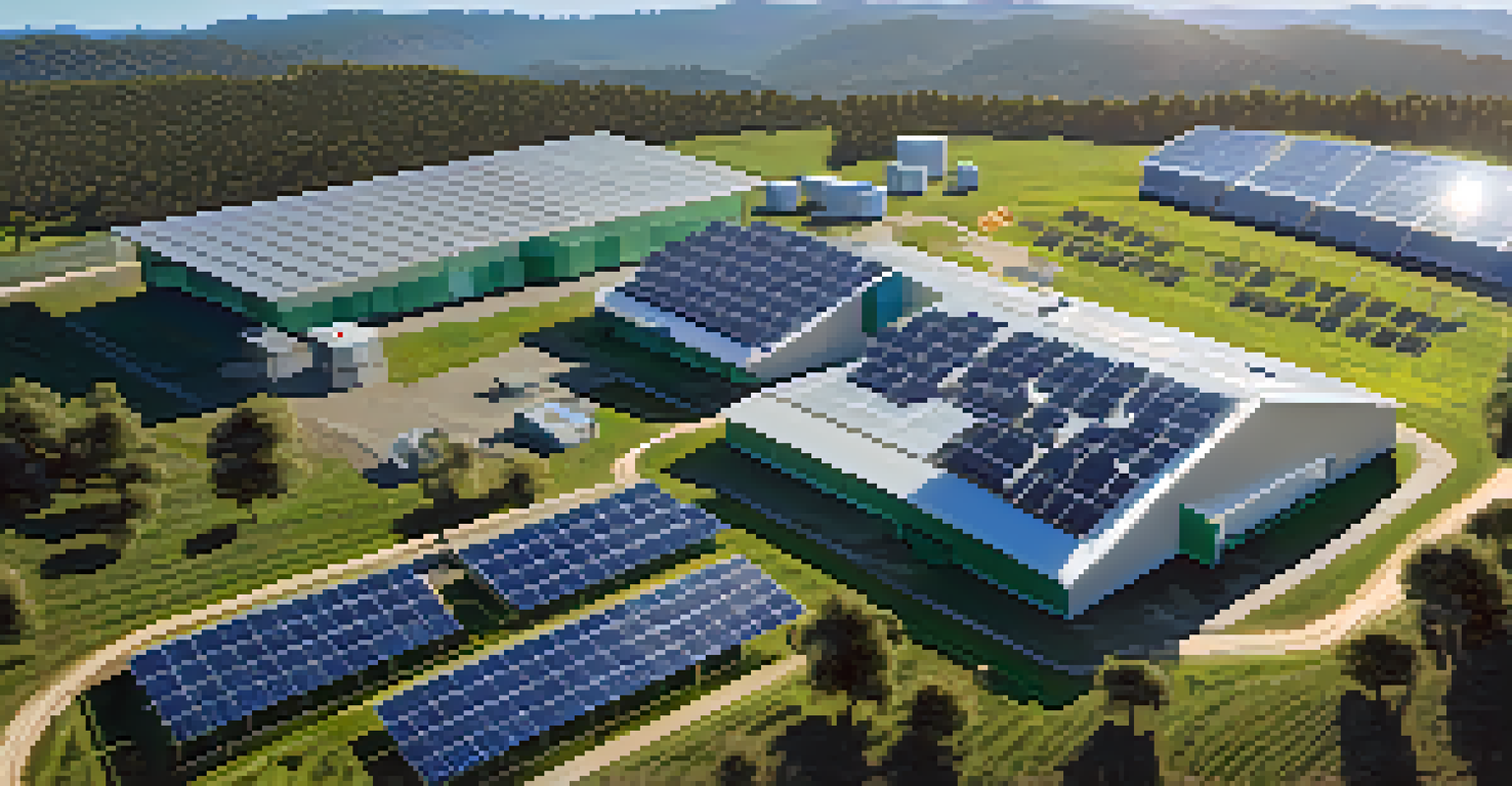The Future of Bitcoin Mining: Innovations and Environmental Impact

Understanding Bitcoin Mining: The Basics Explained
Bitcoin mining is the process by which new bitcoins are created and transactions are verified on the Bitcoin network. Miners use powerful computers to solve complex mathematical problems, a task that requires significant computational power and energy. Essentially, this process ensures the security and integrity of the Bitcoin blockchain, which is a decentralized ledger of all transactions.
The Bitcoin mining process is not just about creating new coins; it's a race against time and energy consumption.
At its core, mining involves competition among miners to be the first to solve a cryptographic puzzle. The winner gets to add a new block to the blockchain and is rewarded with newly minted bitcoins. This competition is what drives much of the energy consumption associated with Bitcoin mining, as miners continuously seek more efficient hardware and energy sources to maximize their profits.
As Bitcoin's popularity has soared, so too has the scale of mining operations. Large-scale mining farms have emerged, often located in regions with low electricity costs. However, this growth raises questions about sustainability and environmental impact, which we will explore further.
Recent Innovations in Bitcoin Mining Technology
The landscape of Bitcoin mining is rapidly evolving, with new technologies emerging that promise to improve efficiency and reduce energy consumption. Innovations such as application-specific integrated circuits (ASICs) have made mining hardware significantly more powerful and energy-efficient compared to traditional CPUs and GPUs. These specialized devices are tailored specifically for mining tasks, allowing for higher hash rates with lower energy use.

Additionally, advancements in cooling technologies are helping miners reduce the heat generated by their operations, which can otherwise lead to higher energy costs. For instance, immersion cooling involves submerging mining equipment in a special liquid that efficiently dissipates heat, allowing miners to operate at optimal temperatures while minimizing energy wastage.
Bitcoin Mining's Environmental Impact
Bitcoin mining consumes vast amounts of energy, raising sustainability concerns and prompting a shift towards renewable energy sources.
Cloud mining is another innovative approach gaining traction, where individuals can rent mining power from remote data centers. This model not only democratizes access to mining but also allows for centralized operations that can leverage renewable energy sources more effectively, further reducing the carbon footprint associated with mining activities.
Environmental Concerns: The Cost of Bitcoin Mining
One of the most pressing issues surrounding Bitcoin mining is its environmental impact, particularly concerning energy consumption. The Bitcoin network is estimated to consume as much energy as some small countries, raising alarms about its sustainability. Critics argue that this level of energy usage is incompatible with global efforts to combat climate change.
Sustainability in Bitcoin mining is not just an option; it's a necessity for the future of the cryptocurrency.
The majority of Bitcoin mining operations rely on fossil fuels, particularly coal, which contributes to high carbon emissions. This has led to a growing backlash against Bitcoin mining, with some regions implementing bans due to environmental concerns. The challenge lies in finding a balance between maintaining the decentralized nature of Bitcoin while also addressing these ecological issues.
Despite these concerns, there is a silver lining. Many miners are actively seeking greener alternatives by utilizing renewable energy sources such as solar, wind, and hydroelectric power. This shift not only helps mitigate the environmental impact but also creates a more sustainable future for the Bitcoin ecosystem.
Renewable Energy: A Solution for Sustainable Mining
The push for renewable energy in Bitcoin mining is gaining momentum as miners recognize the long-term benefits of sustainable practices. By harnessing renewable sources, miners can significantly reduce their carbon footprint while also benefiting from lower energy costs. For instance, some operations are now setting up in remote areas with abundant natural resources, such as hydroelectric power from rivers.
Moreover, the integration of solar panels into mining setups is becoming increasingly popular. Mining farms can now generate their own electricity, reducing reliance on traditional power grids and minimizing exposure to fluctuating energy prices. This self-sufficiency not only promotes sustainability but also aligns with the growing global emphasis on reducing carbon emissions.
Innovations Enhance Mining Efficiency
New technologies, such as ASICs and immersion cooling, are improving Bitcoin mining efficiency and reducing energy consumption.
As the demand for greener mining practices increases, innovative approaches such as energy credits and carbon offsets are emerging. These initiatives encourage miners to invest in renewable energy projects and contribute positively to the environment, creating a win-win situation for both the industry and the planet.
The Role of Legislation in Shaping Mining Practices
Legislation plays a critical role in defining the future of Bitcoin mining, especially regarding its environmental impact. Governments around the world are beginning to recognize the need for regulations that promote sustainable practices within the industry. This includes policies that incentivize miners to adopt renewable energy sources and implement more energy-efficient technologies.
For example, some jurisdictions are offering tax breaks or grants to mining operations that utilize renewable energy. Conversely, regions heavily reliant on fossil fuels are starting to impose stricter regulations or outright bans on mining activities, pushing the industry to adapt. This regulatory landscape is evolving and will significantly influence how mining operations are structured in the future.
As miners navigate this complex regulatory environment, there is a growing call for industry collaboration. Working together, miners can advocate for fair regulations that support sustainable practices while maintaining the decentralized ethos of Bitcoin. This collaboration could lead to the establishment of standards that promote responsible mining and environmental stewardship.
Community Initiatives: Grassroots Efforts for Change
In addition to regulatory efforts, grassroots initiatives are emerging within the Bitcoin mining community aimed at promoting sustainability. These community-driven projects often focus on educating miners about the benefits of renewable energy and best practices for reducing their environmental impact. By fostering a culture of sustainability, these initiatives can bring about meaningful change from the ground up.
For instance, some mining groups are sharing resources and knowledge to help each other transition to greener energy practices. Workshops, webinars, and online forums are becoming popular platforms for discussing innovations and strategies for sustainable mining. This collaborative spirit not only enhances community bonds but also accelerates the adoption of environmentally friendly practices.
Legislation Encourages Sustainable Practices
Governments are implementing regulations that incentivize Bitcoin miners to adopt renewable energy and more efficient technologies.
As awareness of environmental issues grows, more miners are participating in these initiatives, showcasing a collective commitment to change. By leveraging their influence and resources, these grassroots efforts can play a pivotal role in shaping a more sustainable future for Bitcoin mining.
Looking Ahead: The Future of Bitcoin Mining
As we look to the future, the Bitcoin mining landscape is poised for significant transformation. Innovations in technology, a shift towards renewable energy, and evolving regulations will all play crucial roles in shaping this industry. The emphasis on sustainability will likely continue to grow, prompting miners to adopt practices that not only benefit their bottom line but also protect the environment.
The potential for collaboration among miners, regulators, and communities also presents exciting opportunities. By working together, these stakeholders can create a framework that supports responsible mining while fostering innovation. This collaborative approach can lead to a more resilient and sustainable Bitcoin ecosystem that thrives in harmony with the planet.

Ultimately, the future of Bitcoin mining will depend on our collective choices and actions. By prioritizing sustainability and embracing new technologies, we can ensure that Bitcoin mining evolves in a way that aligns with both economic and environmental goals, paving the way for a brighter future in the cryptocurrency landscape.